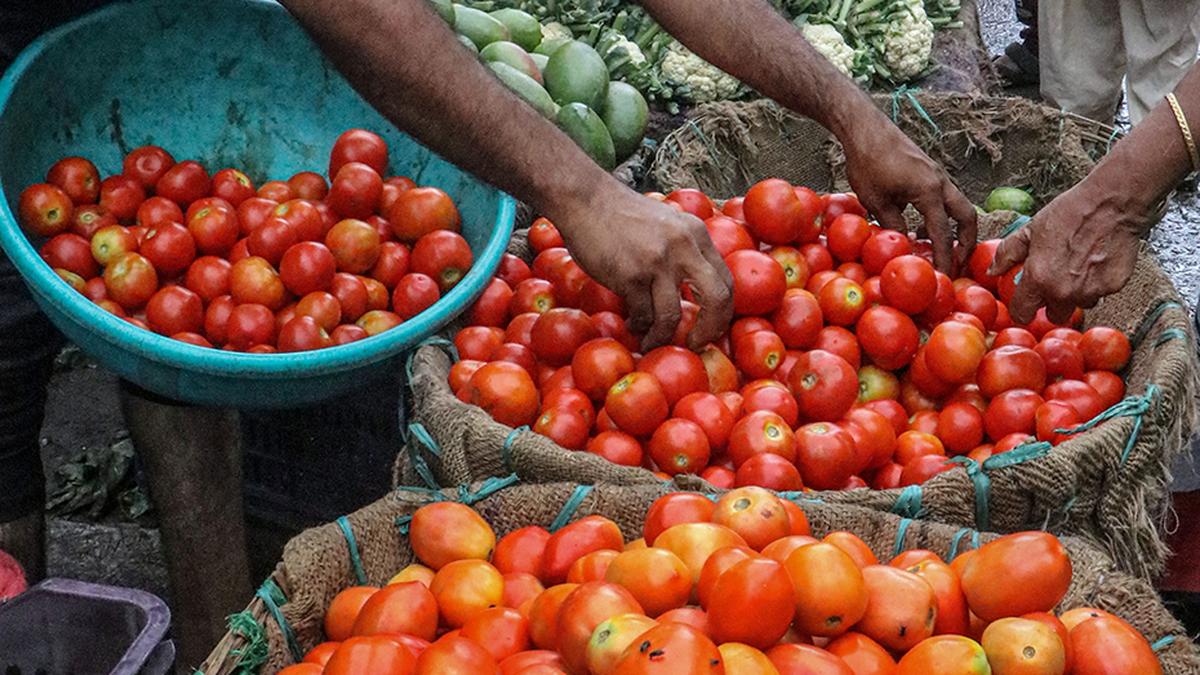
Vegetable prices soar in West Bengal, State government intervenes
The Hindu
Vegetable prices have skyrocketed in West Bengal with chillies and tomatoes seeing a steep increase of more than 200% in the past fortnight.
Vegetable prices have skyrocketed in West Bengal with chillies and tomatoes seeing a steep increase of more than 200% in the past fortnight.
Tomatoes, which used to sell for ₹40-50 per kg a couple of weeks ago, now costs ₹130-150. Green chillies is now selling for ₹300-350 per kg, up from ₹150 per kg a week ago. Other veggies have witnessed a 30-50% price rise.
The situation is no different in the districts where prices of vegetables have shot through the roof, a traders' body official said.
West Bengal Vendors Association president Kamal Dey said the price rise was due to extreme heat and lack of rains. "The crops have dried and wilted, leading to a shortage of vegetables," he said.
Dey said he hoped prices would ease out within a fortnight, as monsoon rains are expected to revive the plants. "Currently, all tomatoes arrive from southern states and the entire country is facing the crisis," he said.
According to experts, new tomato crops are expected to hit the markets in the next 10-14 days.
The West Bengal government has already taken cognizance of the issue and directed its own retailing network, Sufal Bangla, to deliver fair-price vegetables in the city. Sufal Bangla was charging ₹115 per kg for tomatoes and ₹Rs 240 for green chillies.

“Writing, in general, is a very solitary process,” says Yauvanika Chopra, Associate Director at The New India Foundation (NIF), which, earlier this year, announced the 12th edition of its NIF Book Fellowships for research and scholarship about Indian history after Independence. While authors, in general, are built for it, it can still get very lonely, says Chopra, pointing out that the fellowship’s community support is as valuable as the monetary benefits it offers. “There is a solid community of NIF fellows, trustees, language experts, jury members, all of whom are incredibly competent,” she says. “They really help make authors feel supported from manuscript to publication, so you never feel like you’re struggling through isolation.”

Several principals of government and private schools in Delhi on Tuesday said the Directorate of Education (DoE) circular from a day earlier, directing schools to conduct classes in ‘hybrid’ mode, had caused confusion regarding day-to-day operations as they did not know how many students would return to school from Wednesday and how would teachers instruct in two modes — online and in person — at once. The DoE circular on Monday had also stated that the option to “exercise online mode of education, wherever available, shall vest with the students and their guardians”. Several schoolteachers also expressed confusion regarding the DoE order. A government schoolteacher said he was unsure of how to cope with the resumption of physical classes, given that the order directing government offices to ensure that 50% of the employees work from home is still in place. On Monday, the Commission for Air Quality Management in the National Capital Region and Adjoining Areas (CAQM) had, on the orders of the Supreme Court, directed schools in Delhi-NCR to shift classes to the hybrid mode, following which the DoE had issued the circular. The court had urged the Centre’s pollution watchdog to consider restarting physical classes due to many students missing out on the mid-day meals and lacking the necessary means to attend classes online. The CAQM had, on November 20, asked schools in Delhi-NCR to shift to the online mode of teaching.









